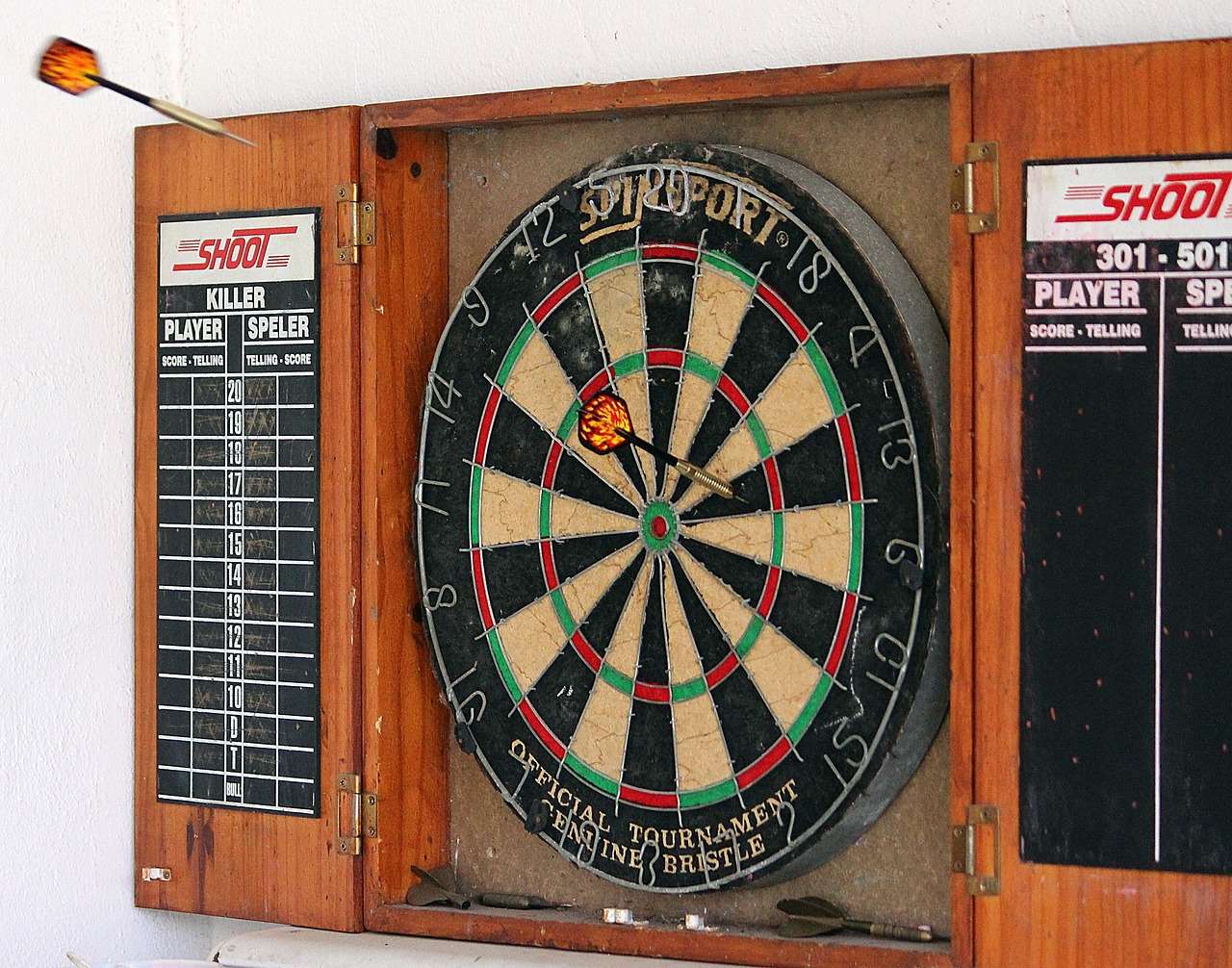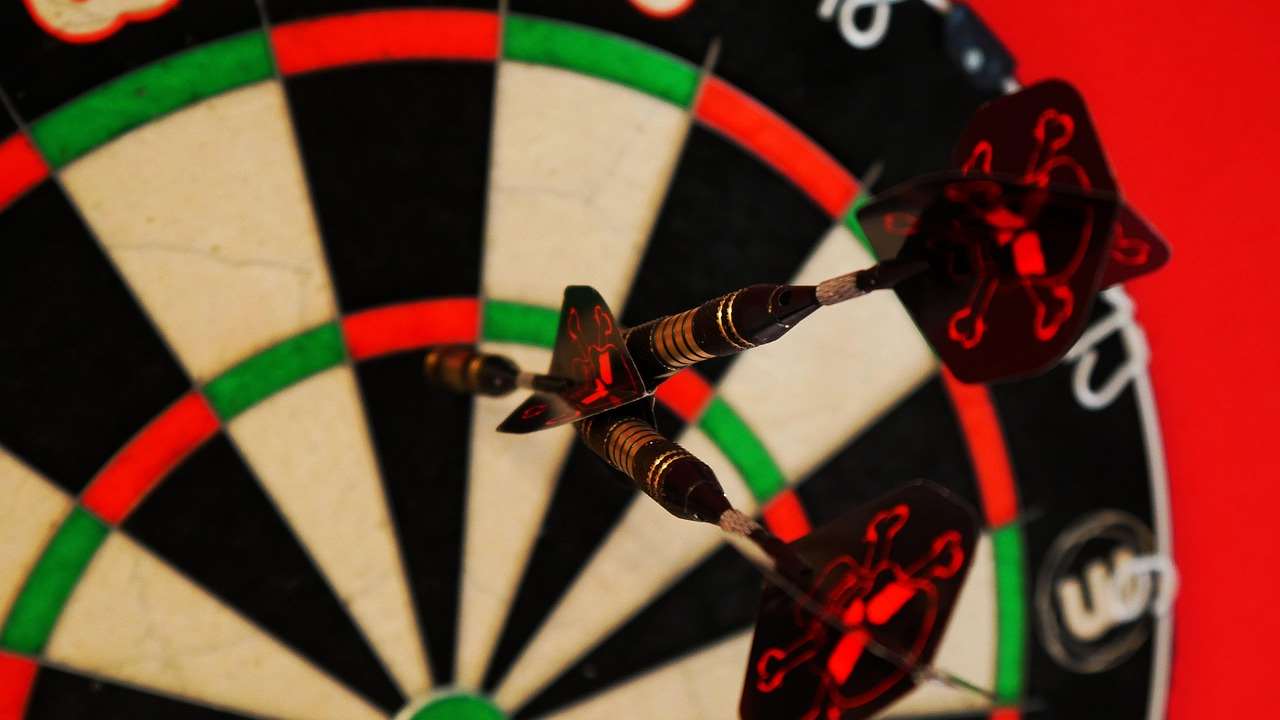The dynamic between **darts players vs crowd** can significantly impact performance; understanding how to manage the pressure and harness the energy is crucial for success in professional darts. This article explores the psychological factors at play, strategies for dealing with crowd interaction, and the unique atmosphere of different darts venues.
⚠️ Still Using Pen & Paper (or a Chalkboard)?! ⚠️
Step into the future! The Dart Counter App handles all the scoring, suggests checkouts, and tracks your stats automatically. It's easier than you think!
Try the Smart Dart Counter App FREE!Ready for an upgrade? Click above!
Understanding the Psychology: Darts Players vs Crowd
The mental game in darts is paramount, and the presence of a live audience adds another layer of complexity. For many darts players, the **crowd** can be a source of motivation and adrenaline, pushing them to perform at their best. However, for others, the pressure can be overwhelming, leading to anxiety and a decline in accuracy. Understanding your own psychological response is the first step in managing the **darts players vs crowd** dynamic.
Several psychological factors come into play:
- Performance Anxiety: The fear of failure, amplified by the presence of a large audience. This can lead to physical symptoms such as increased heart rate and shaky hands.
- Cognitive Overload: The **crowd** noise and distractions can make it difficult to focus on the task at hand, leading to poor decision-making.
- Social Facilitation: The tendency to perform better on simple or well-learned tasks when in the presence of others. For experienced darts players, this can be a positive effect.
- Social Inhibition: The tendency to perform worse on complex or unfamiliar tasks when in the presence of others. This is more likely to affect less experienced players.

Learning to control your emotions and maintain focus under pressure is essential. Techniques such as deep breathing exercises, visualization, and positive self-talk can be helpful. It’s also important to have a pre-game routine that helps you get into the right mental state. Darts are a globally televised sport, so players need to learn to manage the mental pressure.
Strategies for Managing Crowd Interaction
Dealing with **crowd** interaction is a key skill for any professional **darts player**. While some crowds are supportive and respectful, others can be more disruptive and even hostile. Having a strategy for managing these interactions can help you stay focused and maintain your composure.
Ignoring the Noise
One approach is to simply ignore the **crowd** as much as possible. This requires a high level of concentration and the ability to block out distractions. Some **darts players** use techniques such as focusing on a specific point on the dartboard or repeating a mantra to themselves.
Engaging with the Crowd
Another approach is to engage with the **crowd** in a positive way. This can involve acknowledging their cheers and showing appreciation for their support. However, it’s important to do this in a way that doesn’t distract you from the game. Being able to put on a show is part of the entertainment aspect of darts.
It’s also useful to learn how to spot the cues to when the crowd is getting restless, which can be learned playing darts game in london.
Dealing with Heckling
Heckling is an unfortunate reality in some **darts** venues. It’s important to have a plan for dealing with hecklers. One option is to simply ignore them. Another option is to politely ask them to stop. In extreme cases, you may need to involve security. Remember to stay calm and avoid escalating the situation.

Regardless of the approach you choose, it’s important to be consistent and professional. Don’t let the **crowd** dictate your behavior. Stay true to yourself and focus on playing your best game.
The Unique Atmosphere of Different Darts Venues
The atmosphere of different **darts** venues can vary greatly, from small, intimate pubs to large, packed arenas. Each venue presents its own unique challenges and opportunities for **darts players**. Here are some examples:
- Pubs: These venues tend to be more casual and relaxed. The **crowd** is often smaller and more local. The atmosphere can be friendly and supportive, but also more unpredictable.
- Arenas: These venues are much larger and more formal. The **crowd** is often more diverse and enthusiastic. The atmosphere can be electric, but also more intimidating.
- Theatres: These venues offer a unique blend of intimacy and grandeur. The **crowd** is often more respectful and attentive. The atmosphere can be sophisticated and refined.
Understanding the unique characteristics of each venue can help you prepare mentally and adjust your strategy accordingly. For example, if you’re playing in a small pub, you may need to be more aware of your surroundings and adapt to the closer proximity of the **crowd**. If you’re playing in a large arena, you may need to work harder to maintain your focus and block out the distractions. Some older or antique dartboards may be less forgiving than today’s professionally manufactured dartboards. Before competing, you should inspect your setup to make sure it is properly installed.
Home Advantage
Some **darts players** enjoy a significant advantage when playing at home. They are familiar with the venue, the **crowd**, and the surroundings. This can give them a boost in confidence and reduce anxiety. However, it’s also important to avoid complacency and maintain a professional attitude.
Away Games
Playing away games can be more challenging, especially when the **crowd** is hostile. It’s important to be mentally prepared for a tough environment and to stay focused on your game. Remember that you are there to do a job, and don’t let the **crowd** get to you. Use your pre-game routine and visualization to keep yourself on track.

Different types of darts can be used as well. For example, the target darts bolide might provide a unique experience. Also, there are many ways to keep track of your dart scores with a free dart score app available.
Practical Tips for Improving Performance Under Pressure
Here are some practical tips for improving your performance under pressure in front of a **crowd**:
- Practice Under Pressure: Simulate the conditions of a live game by practicing in front of friends or family. This can help you get used to the feeling of being watched and reduce anxiety.
- Develop a Pre-Game Routine: A consistent pre-game routine can help you get into the right mental state and prepare for the match. This might include stretching, visualization, or listening to music.
- Use Deep Breathing Techniques: Deep breathing can help you calm your nerves and reduce anxiety. Practice deep breathing exercises regularly so that you can use them effectively during a match.
- Visualize Success: Visualize yourself performing well and achieving your goals. This can help you boost your confidence and stay focused on the task at hand.
- Stay Positive: Maintain a positive attitude, even when things are not going your way. Focus on what you can control and don’t let negative thoughts creep in.
- Learn from Your Mistakes: Analyze your performances and identify areas for improvement. Don’t dwell on your mistakes, but use them as an opportunity to learn and grow.

Remember that managing the **darts players vs crowd** dynamic is an ongoing process. It takes time and effort to develop the mental skills necessary to perform at your best under pressure. Be patient with yourself, and don’t give up. With practice and perseverance, you can learn to harness the energy of the **crowd** and achieve your goals.
The Future of Darts and Crowd Interaction
As **darts** continues to grow in popularity, the interaction between **darts players vs crowd** is likely to become even more important. Venues will become larger and more sophisticated, and the **crowd** will become more diverse and engaged. **Darts players** will need to be even more skilled at managing the pressure and harnessing the energy of the **crowd**.
Technology may also play a role in shaping the future of **darts** and **crowd** interaction. Virtual reality and augmented reality could be used to create more immersive and interactive experiences for fans. Social media could be used to connect **darts players** with their fans on a more personal level. This could lead to even greater levels of engagement and excitement. Also, consider visiting the Free dart score app to keep up with all the action.
Ultimately, the relationship between **darts players** and the **crowd** is a symbiotic one. The **crowd** provides the energy and excitement that makes **darts** so compelling to watch, while the **darts players** provide the skill and artistry that makes **darts** so captivating to experience. As long as both parties respect and appreciate each other, the future of **darts** is bright.

Conclusion
The dynamic between **darts players vs crowd** is a crucial factor in the sport, influencing performance through psychological pressure, strategic crowd management, and adapting to diverse venue atmospheres. By understanding these factors and implementing practical strategies like practicing under pressure and maintaining a pre-game routine, **darts players** can learn to harness the **crowd’s** energy and perform at their best. Embrace the challenge, hone your mental game, and elevate your **darts** experience!
Hi, I’m Dieter, and I created Dartcounter (Dartcounterapp.com). My motivation wasn’t being a darts expert – quite the opposite! When I first started playing, I loved the game but found keeping accurate scores and tracking stats difficult and distracting.
I figured I couldn’t be the only one struggling with this. So, I decided to build a solution: an easy-to-use application that everyone, no matter their experience level, could use to manage scoring effortlessly.
My goal for Dartcounter was simple: let the app handle the numbers – the scoring, the averages, the stats, even checkout suggestions – so players could focus purely on their throw and enjoying the game. It began as a way to solve my own beginner’s problem, and I’m thrilled it has grown into a helpful tool for the wider darts community.